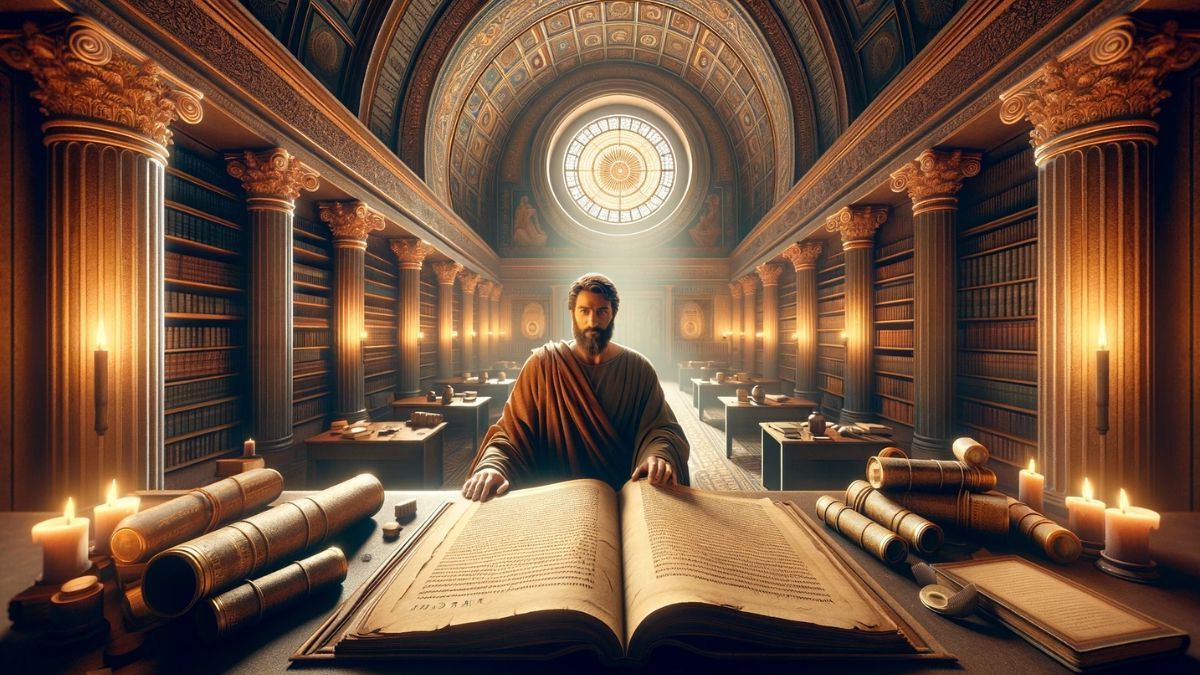
What is Marcionism? Marcionism is an early Christian belief system founded by Marcion of Sinope around 144 AD. This movement introduced a dualistic view, distinguishing between a benevolent God of the Gospel and a malevolent Demiurge, the creator god of the Old Testament. Marcion, a contemporary of Justin Martyr, compiled a canon of eleven books, including a shorter version of the Gospel of Luke and ten Pauline epistles, rejecting the Old Testament entirely. His teachings were denounced as heresy by early Church Fathers like Tertullian. Despite this, Marcionism influenced various Christian groups and modern theological thought, particularly in its anti-Judaic stance.
Who Was Marcion of Sinope?
Marcionism began with Marcion of Sinope, a significant figure in early Christianity. His teachings sparked considerable debate and controversy.
- Origin and Founder: Marcionism was founded by Marcion of Sinope, who lived in the second century AD.
- Early Christian Theologian: Marcion was a theologian, evangelist, and a key figure in the early Christian movement.
- Family Background: Marcion was the son of a bishop of Sinope in Pontus, indicating a strong ecclesiastical background.
- Travel to Rome: Around 140–155 AD, Marcion traveled to Rome and joined the Syrian Gnostic Cerdo.
Marcion's Dualistic Belief System
Marcion's beliefs were dualistic, distinguishing between two gods: one benevolent and one malevolent.
- Dualistic Belief System: Marcion preached a dualistic belief system, distinguishing between a benevolent God of the Gospel and a malevolent Demiurge or creator god, identified with the Hebrew God of the Old Testament.
- Influence of Paul: Marcion considered himself a follower of Paul the Apostle, whom he believed to be the only true apostle of Jesus Christ.
Marcion's Canon and Rejection of the Old Testament
Marcion created his own canon, which significantly differed from what would become the New Testament.
- Marcion's Canon: Marcion compiled a canon of eleven books, including a shorter version of the Gospel of Luke and ten Pauline epistles.
- Rejection of Old Testament: Marcion rejected the Old Testament, considering it the work of the malevolent Demiurge.
- Prominence of Pauline Epistles: In Marcion's canon, Pauline epistles held a prominent position because Marcion believed Paul to be Christ's only true apostle.
Opposition and Denunciation
Marcionism faced strong opposition from early Church Fathers who labeled it heresy.
- Denunciation by Early Church Fathers: Marcionism was denounced by its opponents as heresy, with early Church Fathers like Tertullian writing extensively against it.
- Lack of Marcion's Writings: Despite his influence, Marcion left no writings of his own. His teachings are known through his adversaries.
- Historical Reconstruction: Scholars have reconstructed Marcion's teachings based on the writings of his critics, particularly Tertullian.
Comparison with Gnosticism
Marcion's ideas share similarities with Gnosticism, particularly in his rejection of the Jewish God and the material world.
- Comparison with Gnosticism: Many scholars consider Marcion's ideas close to Gnosticism, especially in his rejection of the Jewish God, the Old Testament, and the material world.
- Anti-Jewish Sentiment: Marcion likely had strong anti-Jewish sentiments, as evidenced by his rejection of the Jewish scriptures and his de-Judaizing of Jesus Christ.
Marcionite Canon vs. New Testament Canon
Marcion's canon was the first Christian canon, predating the 27-book New Testament canon.
- Marcionite Canon vs. New Testament Canon: The Marcionite canon was the first Christian canon compiled, highlighting Marcion's role in shaping early Christian scripture.
- Influence on Later Christian Groups: Despite its rejection by the early Church, Marcionite ideas continued to influence various Christian groups throughout history.
Marcion’s Broader Theological Enterprise
Marcion’s theological enterprise was broader and more creative than often recognized.
- Temporal Overlap with Manichaeism: The temporal overlap between Marcionite groups and early Manichaeism suggests conceptual affinities between the two movements.
- Speculative Links with Later Groups: Some scholars speculate about links between Marcionism and later groups like the Bulgarian Bogomils or the thirteenth-century Cathars in southern France.
- Conceptual Affinities vs. Genealogical Descent: It is crucial to distinguish between conceptual affinities and genealogical descent. While Marcionite ideas may have influenced later movements, direct genealogical links are not always clear.
- Marcion’s Theological Enterprise: Marcion saw Jesus as revealing a new and good God, separate from the capricious God of the Old Testament.
Impact on Church Organization
Marcion’s teachings significantly impacted the organization of early Christian communities.
- Impact on the Church Organization: Marcion’s teachings and actions significantly impacted the loose organization of house churches in Rome, potentially contributing to the introduction of a presiding bishop in the imperial capital.
- Marcion’s Gospel and Epistles: Marcion’s gospel was a shorter version of Luke, and his epistles were a collection of Pauline writings.
Tertullian’s Critique and Historical Significance
Tertullian’s writings provide significant insights into Marcion’s teachings and the critique of his theology.
- Tertullian’s Critique: Tertullian’s treatise Adversus Marcionem provides significant insights into Marcion’s teachings and the critique of his theology by early Church Fathers.
- Historical Significance: The second century was a critical period in Christian history, during which important decisions were made that shaped the contours of orthodoxy. Marcion and his followers were branded as heretics during this time.
Challenges in Studying Marcion
Studying Marcion is challenging due to the biased sources available.
- Challenges in Studying Marcion: Almost everything known about Marcion is communicated through the testimonies of his adversaries. This makes historical reconstruction challenging, as scholars must sift through biased sources to uncover kernels of historical truth.
Modern Scholarship on Marcion
Modern scholars have provided new perspectives on Marcion and his influence.
- Judith M. Lieu’s Work: Judith M. Lieu’s book Marcion and the Making of a Heretic provides a comprehensive account of Marcion, focusing on how he was constructed by his enemies and how his teachings reflect the social currents of the second century.
- Sebastian Moll’s Study: Sebastian Moll’s book The Arch-Heretic Marcion offers new perspectives on Marcion, challenging previous understandings and raising new questions about his role in early Christianity.
Marcion’s Legacy in Modern Theology
Marcion’s ideas have influenced modern liberal theology, particularly in Germany.
- Marcion’s Legacy in Modern Theology: Marcion’s ideas have influenced modern liberal theology, particularly in Germany. The de-Judaizing of Jesus and the scriptures, central to Marcionism, has been a recurring theme in German theological thought.
- Friedrich Schleiermacher’s Interest: Friedrich Schleiermacher, a key figure in modern liberal theology, showed significant interest in Marcion’s ideas. This interest reflects the ongoing relevance of Marcionite themes in modern theological discourse.
Anti-Judaism and Anti-Semitism
Marcion’s form of Christianity is the most explicitly anti-Judaic version ever envisioned.
- Anti-Judaism and Anti-Semitism: Marcion’s form of Christianity is the most explicitly anti-Judaic version of Christianity ever envisioned. This anti-Judaism has been linked to broader theological anti-Judaism and antisemitism in modern German theology.
- David Nirenberg’s Omission: Despite its significance, Marcion’s role in modern theology is often overlooked. For example, David Nirenberg’s Anti-Judaism: The Western Tradition does not mention Marcion’s influence on modern theology.
- Susannah Heschel’s Mention: Susannah Heschel’s The Aryan Jesus does mention Marcion but only briefly. This highlights the need for a dedicated scholarly account of Marcion’s influence on modern theological thought.
- Alon Confino’s Work: Alon Confino’s recent work on Christianity and the Bible under National Socialism also fails to fully explore Marcion’s role in shaping modern theological anti-Judaism.
Modern Forms of Marcionism
Marcionite ideas continue to resurface in modern theological discourse.
- Historiographic Sophistications: The concept of Marcionism as a genealogical category has been explored by scholars. This approach recognizes that Marcionite ideas can resurface in modern discourse, influencing theological thought in significant ways.
- Modern Forms of Marcionism: There are two primary forms of modern Marcionism: the Kantian rationalist ethical form and the Romantic form. Both reflect broader societal influences and theological considerations, highlighting the ongoing relevance of Marcionite themes in modern thought.
Marcionism's Lasting Impact
Marcionism, founded by Marcion of Sinope in the second century AD, left a significant mark on early Christianity. By promoting a dualistic belief system and rejecting the Old Testament, Marcion challenged the emerging orthodox views. His creation of a distinct canon, emphasizing Pauline epistles, forced the early Church to define its own canon more clearly. Despite being labeled heretical, Marcion's ideas influenced later Christian groups and modern theological thought, especially in Germany. His anti-Jewish sentiments and de-Judaizing of Jesus have had lasting repercussions, contributing to broader theological anti-Judaism. Understanding Marcionism offers valuable insights into the complexities of early Christian history and its ongoing impact on theological discourse. This movement's legacy reminds us of the diverse and often contentious paths that shaped the development of Christianity.
Was this page helpful?
Our commitment to delivering trustworthy and engaging content is at the heart of what we do. Each fact on our site is contributed by real users like you, bringing a wealth of diverse insights and information. To ensure the highest standards of accuracy and reliability, our dedicated editors meticulously review each submission. This process guarantees that the facts we share are not only fascinating but also credible. Trust in our commitment to quality and authenticity as you explore and learn with us.


